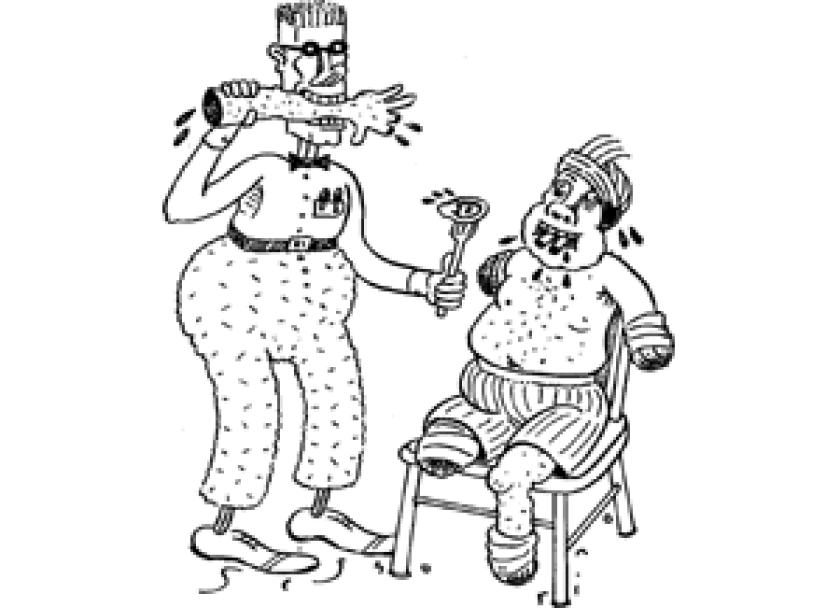Dear Cecil: Recently I read a news item (in a real newspaper, not the Weekly World News) about a man arrested for cannibalism. Allegedly, this guy had placed an ad in some publication expressing his desire to meet somebody whose fantasy was to be devoured — for the purpose of fulfilling the fantasy. Somebody actually answered the ad. Apparently, the two worked out their terms to mutual satisfaction, for in due course the respondent was indelicately dispatched to the hereafter, and his earthly remains were then converted into the ultimate low-carb entree. My question is not “What kind of twist would answer such a classified?” What I’d like to know is, is the fantasy of being eaten a common enough aberration to constitute a psychologically recognized pathology? David English, Somerville, Massachusetts
Cecil replies:
This is a subject on which you’ll thank me not to tarry, David. However, while the cannibalism case you cite has been abundantly, not to say sensationally, reported in the European media, it’s received scant attention in the U.S., and one feels the citizenry ought to know. No doubt the cannibal you have in mind — there can’t be two like this — is Armin Meiwes of Rotenburg, Germany. A seemingly mild-mannered computer technician by day, Meiwes prowled Internet chat rooms and bulletin boards in his off hours looking for people to eat. Sick, sure, but lots of people are sick. What elevates Meiwes’s story out of the ordinary is that he found a volunteer.
Meiwes, who’d been fantasizing about cannibalism since childhood, is said to have exchanged messages with at least 200 like-minded souls, most of whom he met through Web sites catering (sorry, poor choice of words) to cannibal fetishists. By and large his correspondents — even a few who went to his house for play dates — weren’t ready to do more than talk about being eaten, but in March 2001 he hooked up with a fellow who was willing to put his money where Meiwes’s mouth was. Bernd Juergen Brandes, like Meiwes a 40-ish computer geek, traveled to Rotenburg and permitted his host to slice off and cook his central extremity, which the two then attempted to eat. (Apparently it came out a bit tough.) Later, after Brandes had knocked back several further courses of liquor, cough syrup, and sleeping pills, Meiwes stabbed him to death in a bathtub, stored most of the body in his freezer, and eventually ate about 20 kilograms of it. All of this, if you can believe media accounts — I rely here mainly on the BBC — was done with Brandes’s full foreknowledge and cooperation, and Meiwes captured the proceedings on video. Police got wind of it only after they received a call about a year and a half later from an alarmed Austrian student who’d just seen another of Meiwes’s ads seeking dinner partners. At trial — this was Germany’s first cannibalism case — Meiwes’s lawyer argued that the victim had been asking for it, a defense that the court seems to have bought at least partially, since the killer was convicted of manslaughter rather than murder and sentenced to eight and a half years. Many have condemned the sentence as too mild, but defenders say, hey — consenting adults.
As for medical science’s take on it: well, the good news (maybe) is that cannibalism, whether real or fantasized, isn’t mentioned in the formal index of insanity, the Diagnostic and Statistical Manual of Mental Disorders, presumably due to its rarity. (For that matter, necrophilia and vampirism aren’t in there either.) The medical literature on the topic is likewise sparse, and what there is focuses on the eater rather than the eaten. For the record, Brandes’s lovers (he was bisexual) say he seemed outwardly normal. While the trial court concluded that both men were “deeply psychologically disturbed,” a psychiatrist testified that Meiwes was schizoid but not mentally ill, and the defendant did not plead insanity.
How prevalent are interests of this sort? Meiwes claimed there were 800 cannibal fetishists in Germany alone, but in the age of the Internet we needn’t leave it at that. Vore (short for vorarephilia) is a code word for a sexual interest in things eating other things. The things in question aren’t necessarily human, but I figured we could at least stake out the broad dimensions of the issue. Googling vore brought up 995,000 hits. Jeepers, I thought, I’m surrounded! Closer examination, however, showed that what I’m surrounded by may not be deviants but Swedes. (Vore seems to be a common word in several Scandinavian languages.) Trying another tack, I typed in cannibal fetish: 24,800 hits, an impressive number, to my mind, because it’s so plausible. The easily affronted may think this proves it: the Internet is the tool of Satan. Not at all; surely the twists have always been with us. The Net just makes it easier for two of similar proclivities to get together alone.
Cecil Adams
Send questions to Cecil via cecil@straightdope.com.
